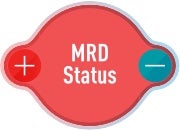Advanced MRD testing in multiple myeloma, CLL, B-ALL, and DLBCL
Pinpoint where your blood cancer stands with clonoSEQ®
What is clonoSEQ?
clonoSEQ (pronounced clo-no-seek) measures minimal residual disease (MRD). This helps uncover how much, if any, cancer remains in your body during and after treatment.1
If you have multiple myeloma, CLL, B-ALL, or DLBCL, talk with your doctor about tracking your MRD status with clonoSEQ.
Questions to ask your doctor
References to “blood cancer” on this webpage refer specifically to multiple myeloma, CLL, B-ALL, and DLBCL.
This page is intended for a US-based audience.
clonoSEQ® is an FDA-cleared test used to detect minimal residual disease (MRD) in bone marrow from patients with multiple myeloma or B-cell acute lymphoblastic leukemia (B-ALL) and blood or bone marrow from patients with chronic lymphocytic leukemia (CLL). clonoSEQ is also available for use in other lymphoid cancers and specimen types as a CLIA-validated laboratory developed test (LDT).
clonoSEQ is only available by prescription from a licensed healthcare professional. Results may vary. Talk to your healthcare provider to see if clonoSEQ testing is right for you. For important information about the FDA-cleared uses of clonoSEQ including test limitations, please visit clonoSEQ.com/technical-summary.
Reference
- clonoSEQ®. [technical summary]. Seattle, WA. Adaptive Biotechnologies; 2020. https://clonoseq.com/technical-summary


